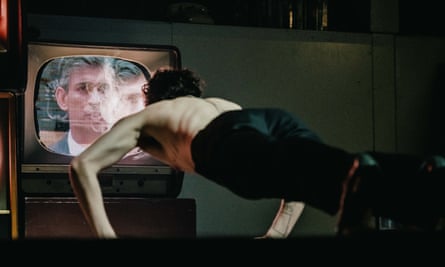A split-level 1970s living room, somewhere between Abigail’s Party and The Ice Storm. Seven members of the 1975’s touring band enter the front door one by one, hang up their jackets and switch on lamps. We see that the eighth, frontman Matty Healy, was there in the dark all along when he gets up from a sofa and shakes himself awake. His suit is sharp but he looks raddled and out of sorts. He lights a cigarette, pours a glass of red wine, sits down at an upright piano and begins to sing: “You’re making an aesthetic out of not doing well/ And mining all the bits of you you think you can sell.” So begins a wonderfully strange, and estranging, experiment in what arena rock can be.
A decade on from their debut LP, the 1975 have the songs and charisma to be one of Britain’s biggest bands and enough restless, self-questioning curiosity not to be content with that. You might reasonably have assumed from the crisp brevity of their latest album, Being Funny in a Foreign Language, co-produced by the ubiquitous Jack Antonoff, that they were refocusing their ambitions after the freewheeling chaos of 2020’s Notes on a Conditional Form, but not so fast.
The show is sharply divided into two acts. The second is a full-pelt romp through the hits. The first, based on the new album, which was released last October, is something else entirely: part performance art, part stage play, part Charlie Kaufman movie about a rock star in crisis. A few songs in, Healy begins a monologue about performance but cuts it short, dissatisfied. A posse of white-coated technicians and stylists appears to make adjustments; one of them snaps a clapperboard and shouts “Action!” – and Healy starts again. This disorienting skit suddenly calls into question whether anything you’re watching – the cigarettes, the wine, Healy’s apparent messiness – is real or theatre, but then of course all rock shows are a kind of theatre. The 1975 have finally found a way to dramatise the self-awareness that defines their songwriting. “Welcome to the show about the show,” Healy says.
It would be a tall order if the new songs weren’t so winning and the sound so richly enveloping. Happiness’s glittering disco pop and Oh Caroline’s swooning chorus would connect in any context, while Part of the Band points up Healy’s underrated kinship with the neurotic, hyperverbal storytelling of Paul Simon. Each song demands its own staging. Healy sings I Like America & America Likes Me from the roof of the set, lit by a single streetlamp, and sinks to his knees for the magnificent About You. During the loping ballad When We Are Together, the show rewinds: the musicians turn off the lights and exit, leaving Healy alone at the piano again. This is when things go a bit Adam Curtis. The singer unpacks the album’s theme of confused masculinity in a thoroughly bizarre sequence involving press-ups, raw meat, digs at Jordan Peterson and Andrew Tate, and Prince Andrew’s face on a bank of TV screens, all soundtracked by Gustav Mahler’s Symphony No 5. “It’s certainly not a festival set,” he says at one point. Indeed not.
It would have been interesting, on grounds of conceptual purity, to end the show right there, but that might have caused civil unrest. Instead, the band reappear in classic rock-star black under the billing “The 1975 At Their Very Best” and crash into If You’re Too Shy (Let Me Know). The crowd exhales. This is what they came for, but after what we’ve just seen, such unalloyed crowd-pleasing has air quotes around it, like a meta-commentary on the subversion and satisfaction of audience expectations. Even in extrovert pop pin-up mode, Healy has a phobia of the obvious. When he’s applauded for showing support for striking workers, he wriggles away from the approval (“Anti-Tory is not a hot take”) and makes a more provocative point about media coverage of industrial action, mocking his own “righteous political passion”. Healy is a tightrope-walker whose talent for capturing the manic, overwhelming quality of modern life in a song such as Love It If We Made It is matched by a gift for melodies as transportingly delightful as Paris and Somebody Else. He has earned the freedom to surprise.
There is a danger that, written down, this might all seem unbearably pretentious and perverse. In the room, though, with an open-minded fanbase, it unfolds as an extraordinary deconstruction and reconstruction of the arena rock show. It might be excessive to compare it to Talking Heads’ great 1984 concert film Stop Making Sense, but it has similar aspirations to defamiliarise the routine business of a band on stage playing songs you like. While the second act makes for a fantastic night out, it’s the unsettling audacity of the first that lingers for a long time afterwards.

